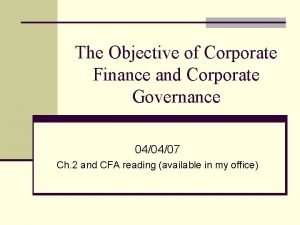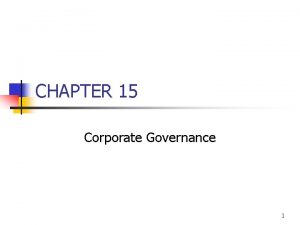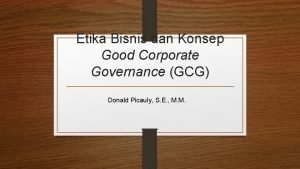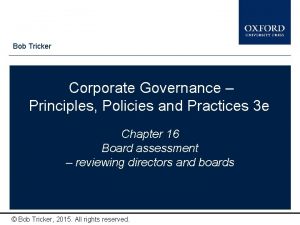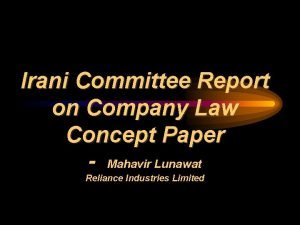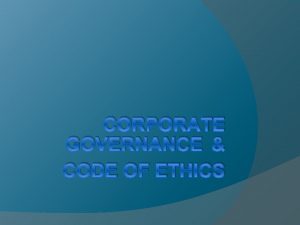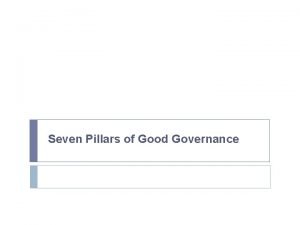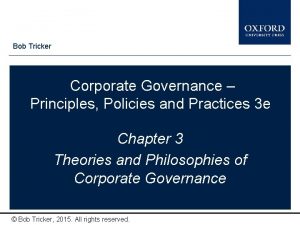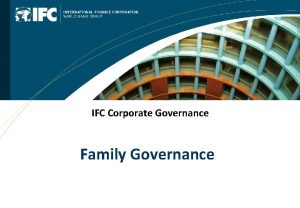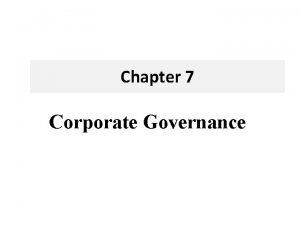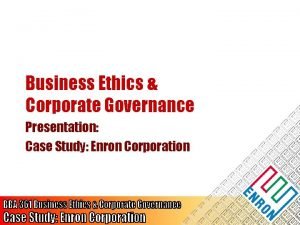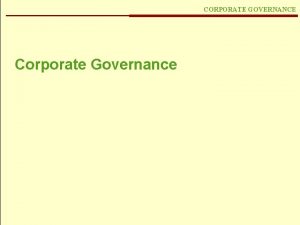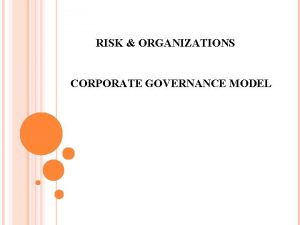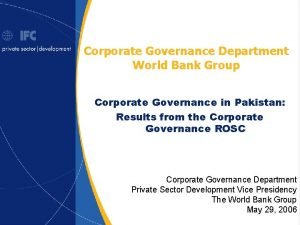Corporate Governance in Maldives Presentation on CMDA CG





























![Management Matters Management Internal Audit External Audit Internal Control [Refer CG Code] Management Matters Management Internal Audit External Audit Internal Control [Refer CG Code]](https://slidetodoc.com/presentation_image_h/085c947d0ea0ad0320bfb5dd6f673070/image-30.jpg)







- Slides: 37

Corporate Governance in Maldives Presentation on CMDA CG Code / Directors Training Program Ms. Mariyam Visam Saturday, 14 th March 2015 14. 00 hrs to 17. 00 hrs

Contents What is Corporate Governance? Aspects of Corporate Governance Benefits of Corporate Governance Reasons for Corporate Governance Approaches Fundamental Principles of Corporate Governance in Maldives Conclusion

What is Corporate Governance? The Organisation for Economic Co-operation and Development (OECD) Principles of Corporate Governance of 2004 defines corporate governance as the system through which companies are directed and controlled

Aspects of Corporate Governance There are many aspects of corporate governance: board and management structure and process; corporate responsibility and compliance; Book keeping, auditing; financial transparency and information disclosure; and ownership structure and exercise of control rights

Benefits of Corporate Governances Corporate governance is essential to achieve optimal performance of any company Without good corporate governance principles, a company could be described as a boat without a rudder; which has no mission and vision to achieve The advantages of good corporate governance are numerous The OECD Principles of Corporate Governance of 2004 states that good corporate governance would increase economic efficiency and growth and it will also boost the confidence of investors

Reasons for Corporate Governance Downfall of gigantic corporations due to mismanagement and poor governance structures led to the emergence of Corporate Governance: eg. corporate and accounting scandals of Enron and World. Com Corporations, like humans need to be disciplined and corporate governance principles assists in the process To implement agency theory needs some guidance principles to be followed

Corporate Governance Approaches in Structure “Rules-based” (rigid) approach Vs. “Principles-based” (flexible) approach Rules-based approach: A rules-based approach instills the code into law with appropriate penalties for transgression; eg. Sarbanes-Oxley Act 2002 or Public Company Accounting Reform and Investor Protection Act US follows rules-based approach Principles-based approach: A principles-based approach requires the company to adhere to the spirit rather than the letter of the code. The company must either comply with the code or explain why it has not through reports to the appropriate body and its shareholders eg. Different Codes of Best Practices

Fundamental Principles of Corporate Governance / Agency Theory Responsibility Accountability Fairness Transparency

Corporate Governance in Maldives The basic principles of corporate governance is found in the Companies Act 10/96 of Maldives Corporate Governance principles for listed companies are found in the CMDA Code of Corporate Governance

Corporate Governance Principles in the Companies Act 10/96 Constitutional Documents of the Company (MOA & AOA- See: s. 4) Relationship between the company & the shareholders (including the rights of the shareholders) Management of the Bo. D of the Companies (See s. 44) Annual General Meeting (See s. 54)

Corporate Governance Principles in CMDA Code of Corporate Governance This code allows for a principle-based system “comply or explain” approach The Code is applicable uniformly to all listed companies, irrespective of the nature of their business. Other public companies are strongly encouraged to comply with the provisions of the Code. Likewise, private companies, and especially those that intend to be listed, are encouraged to comply with the provisions of the Code. All listed companies will be encouraged to voluntarily comply with the Code with effect from 1 January 2007. With effect from 1 January 2008, the Code will be mandatory for all listed companies, unless a specific provision is expressly exempted from such mandatory compliance.

Corporate Governance Principles in CMDA Code of Corporate Governance Mandatory Provisions Board matters Remuneration matters Management Matters Audit, External Audit and Internal Control Company Secretary Disclosure Requirements Systems to raise concern Voluntary Provisions Investor and media relations Individual Board member remuneration disclosure

Board Matters Each director must be well-qualified to carry out his duties and possess the following qualities: Integrity in personal and professional dealings. Wisdom and ability to take appropriate decisions. Ability to read and understand financial statements.

Board Matters An acknowledged record of business acumen and achievement so as to effectively contribute to the company’s management. Ability to deal with others with a sense of responsibility, firmness, and cooperation. Ability to interact with and consult with the company’s employees in order to achieve high management standards. A track record of a range of skills and experience as well as the ability to think strategically and with foresight.

Board Matters Board Member Term No term limit will be set for directors of listed companies generally. However, given the time and effort that directors are expected to spend in executing their duties as listed company directors, it is strongly recommended that directors do not continue as directors for more than a maximum of six (6) years.

Board Matters one third of the Board should be required to retire once every two years to ensure some degree of continuity whilst ensuring that the Board is adequately refreshed.

Board Matters Composition of the Board The size of the Board should be large enough to include directors with diverse expertise and experience to suit the specific requirements of a company and its business. As a guide, the international benchmark on board sizes range from 7 to 10 directors, depending on the size of the company. To ensure active, unbiased and diverse advice is brought to the company, the Board should have a mix of executive, non-executive and independent directors. At least half the Board should comprise non-executive directors, with a majority of such non-executive directors being independent directors.

Board Matters At least two members of the Board should be executive directors. One such director must include the Chief Executive Officer (‘CEO’). The board should periodically review its size and composition.

Board Matters ‘Executive Directors’ are persons who are appointed to the Board and concurrently hold a senior management position in the company, and for the avoidance of doubt includes the CEO or the general manager. For the avoidance of doubts, the CEO refers to a person who performs the functions of chief executive of the company, by whatever name called, and typically includes the general manager and managing director.

Board Matters ‘Independent Directors’ are persons who are appointed to the Board and (the relationships set out below are not intended to be exhaustive): have not held, or whose immediate family members have not held, during the last one (1) year, a key position in the company, such as CEO, general manager, or any immediate employment position; or …. .

Board Matters have not, or their immediate family members have not, during the last one (1) year had any substantial financial dealings, including the receipt of remuneration, commissions, professional fees, payment for goods and services, etc with the company. ‘Non-Executive Directors’ are persons who are appointed to the Board and who are not currently employed by the company, but who, either because they do not qualify to be an independent director or otherwise, cannot be considered an independent director. An ‘immediate family member’ means the spouse and children of the particular director.

Board Matters Nomination Of New / Re-election Of Existing Board Members The Nomination Committee should identify suitable candidates for Board appointments or reappointments and make recommendations to the Board. When nominating new directors, the Nomination Committee should consider the mix of directors’ characteristics, experiences, diverse perspectives and skills that is most appropriate for the company and take steps to ensure women candidates are sought as part of their recruitment exercise in line with the Board Diversity Policy.

Board Matters The search for board candidates should be conducted, and recommendations made, on merit, against objective criteria and with due regard for the benefits of diversity on the board, including gender. Shareholders should have an opportunity to nominate Board candidates, with at least 21 days notice provided to shareholders to allow them to make their nominations. Any shareholder nomination should be reviewed by the Nomination Committee in accordance with the criteria set out in the preceding Paragraph (b).

Board Matters All candidates seeking to be a director must submit at least the following information to the Nomination Committee: education, experience, current directorships, any interests in the company, and in the case of independent and non-executive directors, any other affiliation that may affect the director’s ability to make independent and impartial decisions. The Board must release at least the information provided in the preceding sub-paragraph (d) submitted by the candidates to all shareholders. This information will assist in comparing director candidates and identifying the most suitable person, as well as enable shareholders to make informed decisions.

Board Matters Separation of Chairman and CEO The Chairman and CEO must be separate persons, to ensure an appropriate balance of power and increased accountability. A company must disclose the relationship between the Chairman and CEO where they are related to each other. The Chairman must meet the criteria for independent directors. The division of responsibilities between the Chairman and CEO must be clearly established and set out in writing by the Board.

Board Matters The Board’s role is to: provide entrepreneurial leadership, set strategic aims, provide direction to the Management, and ensure that the necessary financial and human resources are in place for the company to meet its objectives; ensure that a framework of prudent and effective internal controls which enables risk to be assessed and managed is established, and monitor and assess the effectiveness of such internal controls established; review Management performance and determine its remuneration; and set the company’s values and standards, and ensure that obligations to shareholders and other stakeholders are understood and met.

Board Matters The Chairman’s role includes the following as set out: lead the Board to ensure its effectiveness on all aspects of its role and set its agenda; ensure that the directors receive accurate, timely and clear information; encourage constructive relations between the Board and Management; facilitate the effective contribution of non-executive directors in particular during and outside of Board meetings;

Board Matters encourage constructive relations between executive directors and nonexecutive directors; not to unilaterally issue policies without consulting with the Board as a whole with full frank and discussions being completed, and ensure effective communication with shareholders; promote high standards of corporate governance.

Board Committees Nomination Committee – Establishment, Composition, TOR, Disclosure Remuneration Committee - Establishment, Composition, TOR, Disclosure Audit Committee - Establishment, Composition, TOR, Disclosure [Refer CG Code] Remuneration Matters: - Remuneration Policy - Remuneration Disclosure - Evaluation of Board Performance
![Management Matters Management Internal Audit External Audit Internal Control Refer CG Code Management Matters Management Internal Audit External Audit Internal Control [Refer CG Code]](https://slidetodoc.com/presentation_image_h/085c947d0ea0ad0320bfb5dd6f673070/image-30.jpg)
Management Matters Management Internal Audit External Audit Internal Control [Refer CG Code]

Shareholder Rights Shareholder Communications: Companies must engage in regular, effective and fair communication with shareholders at general meetings or through other means. Companies must regularly convey pertinent information, gather views or inputs, and address shareholders’ concerns. In disclosing information, companies should be as descriptive, detailed and forthcoming as possible.

Shareholder Rights Companies must disclose information equally to all shareholders. Where there is inadvertent disclosure made to a selected group, companies should make the same disclosure publicly to all others as soon as practicable. General Meetings: Companies must encourage greater shareholder participation at annual general meetings by requiring shareholder attendance, and allow shareholders the opportunity to communicate their views on various matters affecting the company. Voting Rights : In establishing the voting procedures and rights for companies, the principle of one share, one vote must guide every company. Within a class of shares, all shareholders must have the same voting rights. Information regarding the voting rights of all classes of shares must be available to potential shareholders.

Disclosure Financial Statements Companies must ensure that their financial statements and accounts conform to international standards and thus, strive to have their financial statements and accounts audited to conform with full International Accounting Standards (‘IAS’). The Balance Sheet and Profit and Loss Statement must be reviewed and signed off by the Chairman of the Board, CEO, and the CFO to certify that the accounts reflect a true and fair picture of the company, and that there are no post balance sheet events or off-balance sheet items, the non-disclosure of which can affect the ability of the users of the financial statements to evaluate the company or make decisions.

Disclosure Non-Financial Statements The company must ensure that all current or potential conflicts of interests and interested third party transactions by the directors or the management are disclosed in the annual report. The company must report to the shareholders each year on the remuneration of directors and the key executives (who are not also directors) of the company. This annual remuneration report should form part of, or be annexed to the company’s annual report of its directors.

System to Raise Concerns The Board should introduce a system of ensuring that an appropriate process is put in place to enable employees or Management to raise any concerns that they have, whether on a confidential basis or otherwise, of any non-compliance or fraud or other misdemeanour within the company. The exact implementation process should be left to each company to develop on its own. All employees must be made aware of the system for raising concerns that has been implemented. All employees must also be given the assurance that they will not be in any way penalised for raising the concern. A company which has implemented a system for raising concerns must disclose the same in its annual report.

Voluntary Provisions Sustainability Reporting Media Relations

Q & A
 Mbhni hgwpi
Mbhni hgwpi Objective of corporate finance
Objective of corporate finance Cmda checklist
Cmda checklist Potential problems in corporate governance
Potential problems in corporate governance Tax assurance
Tax assurance Two approaches in corporate governance
Two approaches in corporate governance Makalah etika bisnis dan konsep good corporate governance
Makalah etika bisnis dan konsep good corporate governance Bob tricker corporate governance
Bob tricker corporate governance What is corporate governance
What is corporate governance What is corporate governance
What is corporate governance J.j. irani committee report
J.j. irani committee report Oecd corporate governance principles
Oecd corporate governance principles Good governance and corporate social responsibility
Good governance and corporate social responsibility Oecd corporate governance definition
Oecd corporate governance definition P&g code of conduct
P&g code of conduct Corporate governance strategic management
Corporate governance strategic management Examples of agency problems
Examples of agency problems Corporate governance chain
Corporate governance chain What are the seven pillars of good governance
What are the seven pillars of good governance Bob tricker corporate governance
Bob tricker corporate governance Objective of corporate governance
Objective of corporate governance Ifc corporate governance
Ifc corporate governance Kumar mangalam birla committee
Kumar mangalam birla committee Oecd guidelines for corporate governance
Oecd guidelines for corporate governance Latar belakang munculnya gcg
Latar belakang munculnya gcg Corporate governance and economic growth
Corporate governance and economic growth Driving forces behind csr
Driving forces behind csr Meaning of corporate governance
Meaning of corporate governance Insider system of corporate governance
Insider system of corporate governance Enron ethics case study
Enron ethics case study Contemporary approach to strategic control
Contemporary approach to strategic control Corporate governance is a form of
Corporate governance is a form of Basel committee corporate governance
Basel committee corporate governance Paul ruthman committee
Paul ruthman committee Corporate governance definizione
Corporate governance definizione Corporate governance in sri lanka
Corporate governance in sri lanka Corporate governance clause 49
Corporate governance clause 49 Corporate governance lecture
Corporate governance lecture

